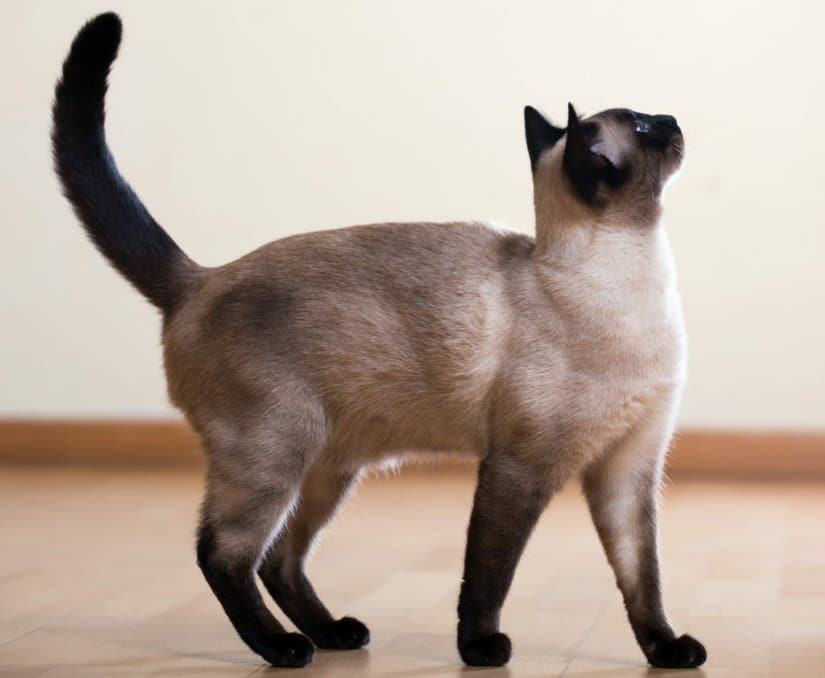The Siamese cat breed is an Asian cat breed that has lots of history. It became a popular cat breed in the U.S and Europe during the nineteenth century. The Wichienmaat (Siamese cat) was first noticed in very old manuscripts, called the Cat Book Poems during 1351- 1767 AD.




(Thailand)
Brief History
The Siamese cat breed is from Siam (Thailand), and is known for its exotic markings. The Siamese cat breed is thought to have originated with the Royal family in Siam. This cat breed was used to guard temples. In 1878, the first Siamese cat arrived in the U.S. Then in 1884, a breeding pair of Siamese cats were brought back to the U.K by Mr. Owen Gould for a family member. Pho and Mia, the breeding pair had kittens. These kittens showed at the Crystal Palace in 1885, but died after the show. That said, more Siamese were imported to the U.K. In 1901 the Siamese Cat Club was formed. This formed the breeding base in the U.K for the Siamese cat breed.
The very first Siamese were medium-sized and long. They were also muscular, graceful, athletic and sleek. The Siamese were a spectacular breed. By the 1950’s and 1960’s, Siamese cat judges wanted a slenderer look, and a longer more refined Siamese cat breed resulted. The more refined Siamese also had a narrower head, long, thin tail, and slender legs. Today, the International Cat Association, (TICA) and the World Cat Federation(WCF) accepts breeds that are less refined.
Physical Description
The modern Siamese cat breed has an elongated head with a tubular, muscular body. This cat breed has a triangular head from the nose tip to each ear. With eyes that are almond-shaped, and piercing blue in color, the Siamese cat breed has ears that are large-based and wide. This spectacular feline breed is not only regal, but affectionate and intelligent. The neck is long and slender. The tail is thin and slender, with the coat being short and shiny. There is no undercoat. The piercing blue eyes and pointed color characteristics differ this cat breed from the Oriental Shorthair cat breed. The Siamese has a black mask, black paws, and black tail with a light-colored coat.
Temperament
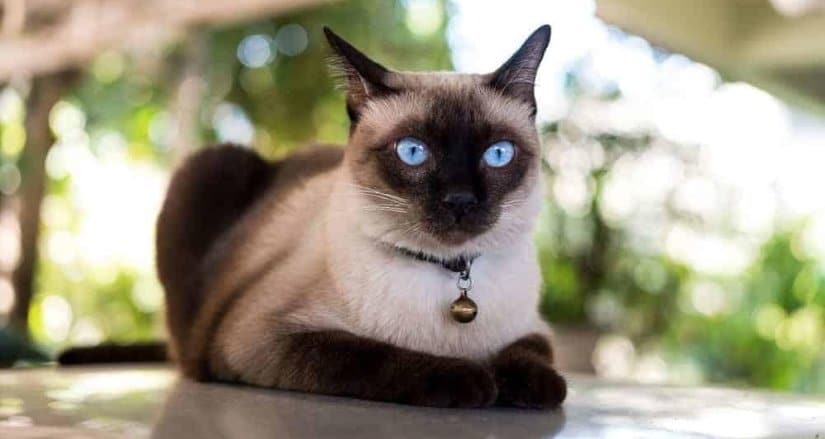
Siamese cats are very sociable. They enjoy being around family, and do not do well being alone all day. The Siamese is an extroverted cat breed that loves to play, follow you around the house, and go for long walks. They are a one-person cat breed that bond closely with their pet parent. Siamese are known to be vocal when trying to get your attention. This very regal and affectionate cat breed does well with apartment and indoor living. The Siamese may be prone to feline depression and anxiety if left alone for long periods of time. This cat breed does well with plenty of TLC!
Special Needs
The Siamese does best as an indoor cat, but many have done well out in farms as well. The Siamese may be prone to certain illnesses, so it’s best to always keep a close eye on this fabulous cat breed. This cat breed is intelligent, and does well with apartment living or home living. The Siamese needs to be indoors during the hot summer months, as it is heat sensitive. It is a wonderfully easy cat breed to live with, but does need mental stimulation. The Siamese gets bored, and incredibly depressed and anxious when alone for long periods of time.
Litter boxes for cats need to be kept clean, or your cat may not use it. Self-cleaning litter boxes ae popular today, and help with time management, allowing for more time to play time with kitty! Opt for environmentally friendly cat litter. Litter mats help keep everything tidy.
Cats will need parasite control and routine health care throughout its life. This means vaccinating your Siamese. This is an important part of keeping your cats healthy throughout their lives. Consult with your veterinarian for advice as to the safest flea and tick products to use.
Your Siamese will also need to be spayed or neutered. Your cat needs to be protected from household dangers like cleaning supplies, toxic plants, electrical cords, and aggressive animals. Cats are carnivores, and will need a high-quality diet with plenty of fresh water every day. Exercise can be achieved through a variety of play toys that encourage running and a game of chase. Sedentary cats may be prone to obesity, and health problems later on in life.
Possible Health Concerns
The Siamese is a healthy and moderately active cat breed that may be susceptible to the following health conditions:
- Mammary Tumors: This is common in cats. 90% of mammary tumors are malignant. The cause is unknown, yet hormones affect their development. This is mostly seen in cats that are 11 years plus, and that have not been spayed. Although spaying at a young age is a plus, there is not much research as to how much the risk is decreased. More studies have been done with dogs. Breast tumors will spread to the lungs. Consult with your veterinarian for treatment.
- Progressive Retinal Atrophy: This is a group of diseases that cause degeneration of the retina. This also includes inherited abnormalities of the light-sensitive retina layer. Cataracts are common toward the end of PRA. This results in it being difficult to detect underlying diseases of the retina. Consult with your veterinarian.
- Lung Infections: Siamese kittens are more prone to these during kittenhood. Respiratory disorders may involve the excess secretions from the lungs. Consult with your veterinarian for antihistamines, cough meds, and diuretics. Immunization will help control certain types of respiratory infections. Keep your Siamese stress free and away from dampness, cold drafts, poor ventilation, and sick cats.
- Osteochondrodysplasia: (OCD) This is a developmental abnormality that affects bone and cartilage in Siamese cat breeds. Many Siamese cats are affected by OCD. It can also affect the limbs, and cause distortion with extreme pain and arthritis. OCD has been seen as early as 8 weeks in kittens, and continues throughout a cat’s life. Symptoms are chronic pain and lameness. Consult with your veterinarian.
- Vestibular Disease: This is caused by a congenital abnormality. It may also result from trauma inside your cat’s ear. It may be caused by cancer or certain infections. It affects the nervous system in cats, and causes a lack of coordination. Consult with your veterinarian.
- Feline Hyperesthesia Syndrome: This is also known as rolling skin disease which is a rare illness in domesticated cats. It results in periods of self-mutilation and agitation. There is also a rippling of the skin when touched. It is a seizure disorder. Consult with your veterinarian for advice. Your cat’s environment will need to be kept as calm as possible when your cat experiences an episode.
Exercise
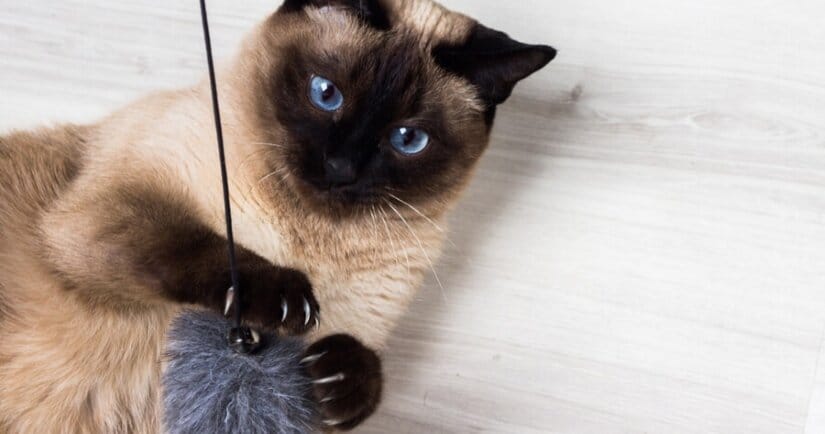
The Siamese cat breed needs daily exercise combined with plenty of mental stimulation through active play and interaction with people. Cat parents can use cat toys like the Mousr or Cat Dancer to get their cats to play. This will encourage your cat to play.
Finding a variety of mentally stimulating cat toys will allow for your cat to lead a well-balanced life, with the right amount of exercise and mental stimulation. Cat harnesses also allow for daily walks. These need to be gradually introduced until your Siamese is used to his harness. Consult with your veterinarian first.
The Siamese cat breed is an intelligent and very affectionate cat breed that does well in most cat friendly environments. That said, this cat breed still needs to play and interact with people., and should not be left alone all day. Cat gyms, cat scratchers, and interactive cat toys within a cat friendly home environment work best for this fabulous cat breed.
Look out for the latest cat toys like Ripple rug play mats, the Feather Whirls, pet cube toys, food trees, turbo scratcher toys, cat companion interactive toys, and electronic motion toys. All these and many more will keep your Siamese kitty entertained when you’re out and about.
Poly Rattan weaved cat scratchers make for longer lasting cat scratching posts. They are more durable, and built to last. Hemp toys for cats are irresistible. Some come with colorful feathers and hemp cord allowing for longer playtime with your feline.
Chasing, hunting, and attacking toys are some of the methods that cats will use when playing with interactive toys. When out shopping for cat toys, opt for safe TPA materials that have no toxic BPA or BHT. Multilevel spinning ball cat toys help cats bat and chase play. Ultimately, what feline pet parents need to achieve is bonding through free play and exercise.
Nutrition
Always take notice of your cat’s eating behavior. If your Siamese suddenly has a lack of appetite, it could indicate a serious illness. That said, if after a day, he’s still not eating, visit your veterinarian. Fresh, clean water needs to always be on hand for your cats. Canned cat food contains moisture, yet water should never be withheld from your cat. By feeding the proper amounts of cat food, you’ll also prevent your cat from becoming obese. Healthy cats are less prone to heart disease, arthritis, and a shorter lifespan.
The Siamese cat breed will need proper nutrition. That said, a high-quality diet that is appropriate for the specific life stage of the cat is necessary. Protein as an ingredient, needs to come first. Dry cat food is a popular choice because it promotes healthier gums and teeth. Yet, wet food is highly recommended by veterinarians because it provides more moisture to cats. Cats don’t drink a lot of water and tend to sometimes get dehydrated. Wet cat food also has its benefits.
By choosing a well-known name- brand cat food that has scientific backing, as well as quality control, cat parents can be assured that they are providing a well-balanced diet. Consult with your veterinarian for advice.
All cat breeds need high- quality fat and protein in their diets. They also need amino acids, including taurine that cannot be found in either human food or dog food. There are also numerous specialty diets for your cat that are formulated specifically for certain medical problems like urinary tract disorder, obesity, or kidney disease.
All cats do well by being fed twice daily. During kittenhood, kittens will need to be fed every few hours. Growing kittens need more calories, nutrients, vitamins, protein, and calories. Your Siamese cat should be able to enjoy a peaceful meal in a quiet corner of the house. Some cat parents prefer to leave cat kibble out 24/7. When looking for a high-quality cat food, here’s what to look out for:
- No low-quality fillers
- No artificial additives
- Low grade ingredients or toxic ingredients
- All cat food has to be meat-based because all cats are carnivores
- No garlic
- Plant-based ingredients should be listed after the protein-based ingredients
To select the best cat food for your Siamese, look at age, breed, and any medical conditions that your cat may be prone to. Read the ingredient list very carefully, and make sure that you always consult with your veterinarian for nutritional advice.
Grooming
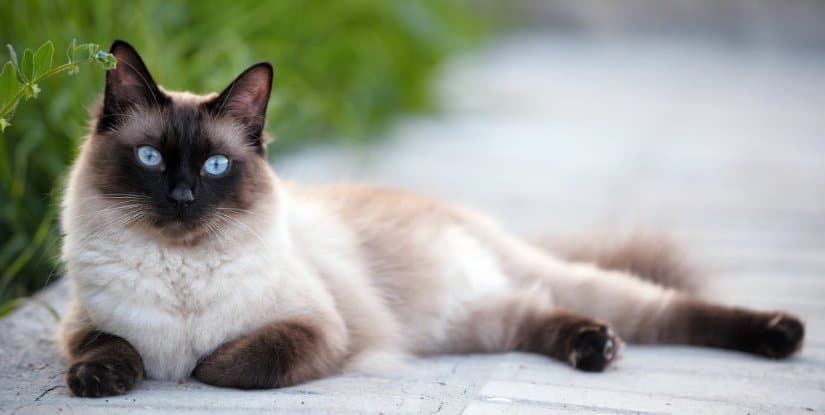
The Siamese needs daily grooming to remove shedding or dead hair. Because this breed has a short and fine, soft coat, grooming is easy. Stainless steel combs help to remove dead hair. Care must be taken when grooming leg hair and body hair to avoid sensitive areas. Some cats have very sensitive areas along their backs, legs, and belly area. Curry brushes help with grooming, and will remove dead hair and debris from your cat’s coat.
Look for high-quality pet products to decrease shedding, and help prevent hairballs. Products like the Furminator will easily groom through your cat’s coat, and safely remove dead hair without hurting your cat. Soft tip massagers, deluxe nail trimmers, and de-shedding tools all help make cat grooming so much easier.
All cat breeds will groom themselves several times throughout the day. Daily grooming is necessary because it limits the amount of hair that your cat will consume. This helps limit the development of hairballs. Your Siamese cat will enjoy being groomed. Coat hair always looks best during the cold winter months. Cats that have been spayed or neutered will have great coats year- round. This is because hormonal changes in cats affects coat length and thickness.
Daily cleaning with pet wipes beneath the tail is necessary. Ears should be checked weekly for cleanliness and sensitivity. If there is a build-up of wax and dirt, organisms can lead to an ear infection. Consult with your veterinarian about safe and gentle ear cleaning techniques. Nail trimming is necessary every few weeks. Eyes should also be cleaned gently every morning with cotton wool or a soft wipe. Each eye should be cleaned with different wipes or cotton balls to avoid eye infection contamination in both eyes.
Healthy Siamese need minimal bathing with a gentle cat shampoo. Your cat will need dental care as well. By feeding dry food, and having professional dental cleanings with your veterinarian throughout your cat’s lifetime, your cat will have less of a chance of developing gingivitis or gum disease. Cats should also have their teeth brushed a few times a week with a special feline toothpaste and brush.
Adopting a Siamese
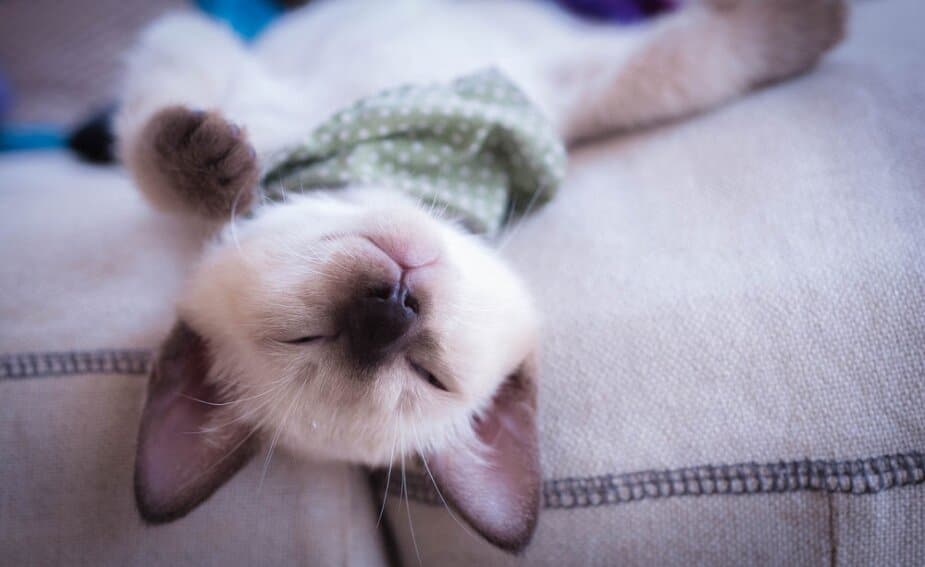
Socialization is very important for all cat breeds, no matter how sweet a breed is. With socialization, cats learn how to get along with other cats, animals, and people. That said, your Siamese should never be placed in a dangerous environment or be near aggressive dogs or people. This cat breed needs to spend a fair amount of time with his pet parent and family.
All cat breeds that have not been socialized during kittenhood, and during the latter stages of life will fear humans and avoid human contact. By playing with and providing the best care for your rescue, you’ll be developing a close bond, and working toward reducing, and eventually eliminating any negative feline behaviors with positive clicker training.
Natural feline behaviors like urine marking, soiling outside the litter box, fighting with a new cat may be behaviors that you’ll have to deal with when bringing your new cat home. If you have other cats at home, they may be territorial, and see the newcomer as a threat. All these problems can be worked through with the help of a good veterinarian and cat behavioral therapist.
That said, the Siamese is one of the most popular cat breeds around the world! With their sensitive, yet feisty personalities, this vocal cat breed has plenty of attitude. Adopting a Siamese will be extremely rewarding! With so many cats up for adoption, it is the only way to go! There are so many cats in shelters today that desperately need a good home. When choosing your cat, ask questions, and look for a great temperament! Some cats like the Siamese may be depressed or anxious at shelters, but soon settle down in their new homes, and become very friendly and sociable.
In addition, kittens should be playful and curious. Sickly kittens that have bad odors or plenty of diarrhea stains, and a dull coat need to be seen by a veterinarian as soon as possible. Kittens when ill, can go downhill very quickly. However, the rewards of adopting a sick animal and caring for it are tremendous, provided that good veterinary care is provided right away. Healthy Siamese kittens will also need plenty of care, numerous daily feedings, veterinary check-up visits, socialization, and positive litter box training. Keep in mind that vaccinations and parasite control are an important part of feline health care.
Consider pet health insurance for your Siamese. With so many great and affordable pet health plans available today, there’s no reason to avoid keeping your pet covered in case of an emergency.
Your Siamese will also need to be protected from household hazards, most especially electrical cables, poisonous plants, medication, and open windows. This cat breed makes for a wonderful adoption! As usual, make sure that children are always gentle and quiet around your cat, and that no aggressive dogs or animals are nearby.
Give your Siamese time to adjust to his new surroundings. As with any cat adoption, make sure that you have the time and resources to take good care of this wonderful cat breed!
Frequently Asked Questions
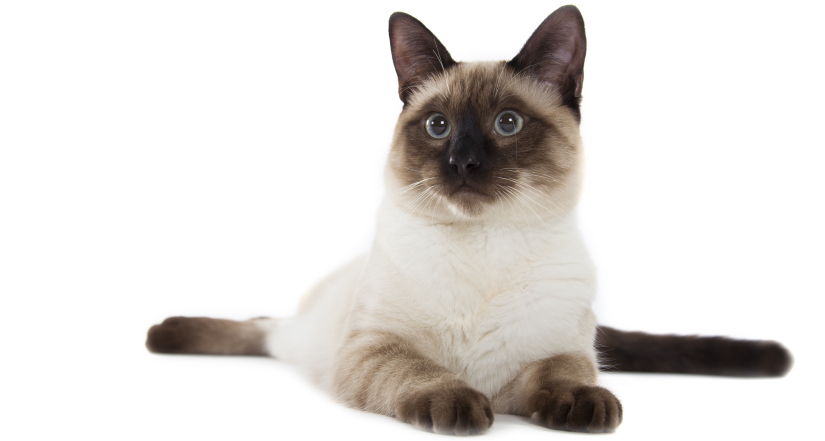
Do Siamese cats like to cuddle?
Most pet parents explain that male cats tend to be more affectionate than their female counterparts. Males are more into physical interactions such as cuddles than females, but of course, the females are just as loving as the males in their ways.
Do Siamese cats shed a lot?
Like all other cat breeds, this cat breed sheds but not as much as other cat breeds. Shedding is a natural process in most cat breeds (not hairless ones, though), and you should not be worried about it. Keep in mind that daily grooming will help minimize loose hairs.
Do Siamese cats shed all the time?
They tend to shed mainly during the spring when they lose their winter coat and during the fall when getting their winter coat. They grow a thick undercoat. You should invest in a good cat grooming brush to minimize shedding throughout the home. You can also use grooming wipes after grooming.
Do Siamese cats have a lot of dander?
Cat breeds with no hair or short coats will present some dander, but there is much less dander in this cat breed than in other cat breeds. This means that this cat breed does no spread much dander around the home, and they are a good match if you suffer from allergies.
Do Siamese cats pick one person?
This cat breed is known to “opt” for a favorite pet parent to whom they will be highly attached. This is usual behavior for this breed, yet this breed loves being around family members and is generally affectionate with everyone.
What health problems do Siamese cats have?
This cat breed may be predisposed to specific health issues. Progressive retinal atrophy (PRA) also affects the Siamese cat breed as well as hip dysplasia. You should also be aware of lysosomal storage diseases like Niemann-Pick disease, mucopolysaccharidosis, and gangliosidosis (GM1) that affect these cats, as well as systemic amyloidosis.
What do Siamese kittens & adult cats like to play with?
This cat breed enjoys a toy that invokes curiosity. They love to run and play and are high-energy animals, so they won’t be satisfied with a mouse that doesn’t move or make any sounds for a few minutes.
Your best bet is to have an assortment of cat toys like balls, moving mice, fishing poles/teasers, and interactive cat toys that make interesting sounds and move. A cat tree and plenty of different shaped cat scratchers are always a must-have for any cat breed.
Siamese Rescue Groups
Siamese Rescue
- Address
- Locust Dale, VA
- Website
- www.siameserescue.org
- Phone
- (540) 6726373
- vasrc@siameserescue.org
Southern California Siamese Rescue
- Address
- Agoura Hills, CA
- Website
- www.californiasiameserescue.org
- Phone
- (818) 8303380
- vinfo@californiasiameserescue.org
Kansas City Siamese Rescue
- Address
- Lee’s Summit, MO
- Website
- www.kcsiameserescue.org/wb/index.php
- Phone
- (816) 3319700
- info@kcsiameserescue.org
Austin Siamese Rescue
- Address
- Austin, TX
- Website
- www.austinsiameserescue.org
- Phone
- (512) 3547875
- loveasiamese@gmail.com
Purrs Abound Siamese Rescue of Michigan
- Address
- Rochester Hills, MI
- Website
- purrssiameserescue.rescuegroups.org
- information@purrsabound.com
New York City Siamese Rescue
- Address
- New York, NY
- Website
- nycsiamese.webs.com
- Phone
- (646) 3493644
- nycsiameserescue@yahoo.com
RESCUE Siamese and Stray Cats
- Address
- Winnipeg, MB
- Website
- rescuesiamese.com
- Phone
- (204) 2556896
- rescue_siamesewpg@hotmail.com
Siamese Breeders in the USA
Clowntown Cattery (Arizona)
- Address
- Phoenix, AZ
- Website
- www.clowntowncattery.com
- Phone
- (602) 7174830
- clowntwn2@aol.com
Siam Moon (Arizona)
- Address
- Casa Grande, AZ
- Website
- www.siam-moon.com
- Phone
- (520) 2808954
- admin@siam-moon.com
Tresor Cats (California)
- Address
- Suisun City, CA
- Website
- www.tresorsiamesecats.com
- Phone
- (707) 4293346
- tresorcats@comcast.net
Diane Dunaway (California)
- Address
- San Diego, CA
- Website
- www.siamesekittens.com
- Phone
- (858) 4848575
- welovesiamese@aol.com
CloudCity Cattery (Colorado)
- Address
- Denver, CO
- Website
- cloudcitycattery.com
- cloudcitycattery@comcast.net
Gotier Siamese (Florida)
- Address
- Fort Lauderdale, FL
- Website
- www.gotiersiamese.com
- gotier2@aol.com
Katsmith (Florida)
- Address
- Central Florida
- Website
- www.katsmith.net
- Phone
- (917) 9699482
- cats@katsmith.net
Kittentanz (Georgia)
- Address
- Atlanta, GA
- Website
- kittentanz.com
- Phone
- (404) 4282287
- catman@kittentanz.com
Kaluamoa Cattery (Hawaii)
- Address
- Lawai, HI
- Website
- hawaiisiamese.com
- Phone
- (808) 3327900
- kksp@juno.com
Siamese Royalty (Illinois)
- Address
- Central-Southern IL
- Website
- www.siameseroyalty.com
- Phone
- (618) 4434368
- marieclements@siameseroyalty.com
Rosebud’s Siamese Cattery (Indiana)
- Address
- Fort Wayne, IN
- Website
- rosebudssiamese.com
- Phone
- (260) 4325308
- rosebud2953@msn.com
Southern Traditional Siamese (Louisiana)
- Address
- Ponchatoula, LA
- Website
- southerntraditionalsiamese.com
- Phone
- (985) 5421681
- southerntraditionalsiamese@gmail.com
Blue Eyes Cattery (Maryland)
- Address
- Southern Maryland
- Website
- www.blueeyescat.com
- Phone
- (240) 9253058
- info@MarylandSiamese.com
Katz Meow (Louisiana)
- Address
- Waterford, MI
- Website
- southerntraditionalsiamese.com
- Phone
- (985) 5421681
- southerntraditionalsiamese@gmail.com
Breeders in the Canada
Tybet Sapphire Siamese
- Address
- British Columbia
- Website
- www.facebook.com/tybetsapphiresiamesekittens
- Phone
- (604) 9895515
- tybetsapphiresiamese@gmail.com
Ayuthaya
- Address
- Toronto, Ontario
- Website
- www.ayuthayasiamese.com
- Phone
- (416) 4692284
- susan.perkins.siamese@gmail.com
Sa-Shai Siamese
- Address
- Ottawa, Ontario
- Website
- www.sa-shaisiamesecats.com/Index/Welcome.html
- Phone
- (613) 8243726
- sa.shai@icloud.com
Classic Jewels Siamese
- Address
- Milton, Ontario
- Website
- www.classicjewelssiamese.com
- Phone
- (905) 6913183
- classicjewelssiamese@gmail.com
Royal Gem Siamese
- Address
- Ontario
- Website
- royalgemsiamese.com
- Phone
- (289) 9623000
- royalgemsiamese@gmail.com
Practical Cats
- Address
- Innisfil, Ontario
- Website
- www.practicalcats.ca
- info@practicalcats.ca
Zsuzse Siamese
- Address
- Calgary, Alberta
- Website
- www.siamese-zsuzse.com
- Phone
- (403) 2795815
- zwaruns@telus.net
Breeders in the Great Britain
Whalleybush Siamese
- Address
- Milton Keynes, Bucks
- Website
- www.whalleybush-siamese.co.uk
- Phone
- (07748) 702292
- paula.hargan@btinternet.com
Bellis
- Address
- Audlem, Cheshire
- Website
- www.bellissiamese.co.uk
- Phone
- (01270) 811078
- BellisSiamese@aol.com
Emrys Siamese
- Address
- Devone
- Website
- www.emrys-siamese.co.uk
- meow@emrys-siamese.co.uk
Hubbell
- Address
- Hampshire
- Website
- www.hubbellsiamese.co.uk
- webmaster@catplanet.co.uk
Mazpahs Siamese, Orientals & Bicolours
- Address
- Bolton, Lancashire
- Website
- www.mazpahssiamese.co.uk
- Phone
- (07523) 175442
- mazpahs@hotmail.co.uk
Wiccanways
- Address
- Wigan, Lancashire
- Website
- www.wiccanways.me.uk
- Phone
- (01942) 620048
- debbiedavies@blueyonder.co.uk
